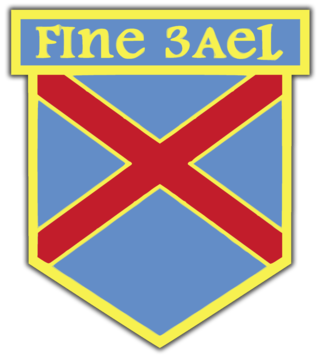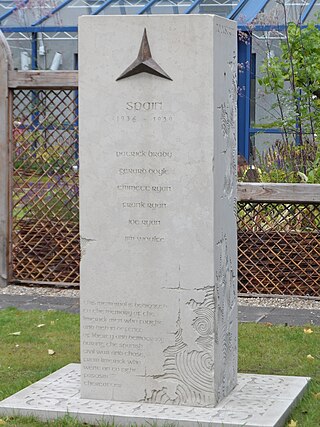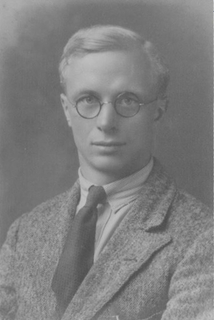
The Spanish Civil War lasted from July 17, 1936 to April 1, 1939. While both sides in the Spanish Civil War attracted participants from Ireland, the majority sided with the Nationalist faction.

The Spanish Civil War lasted from July 17, 1936 to April 1, 1939. While both sides in the Spanish Civil War attracted participants from Ireland, the majority sided with the Nationalist faction.
Feeling in Ireland in the 1930s ran overwhelmingly against the Second Spanish Republic due to the opposition by the Catholic Church.
Following the July coup by the generals in Spain, a wave of atrocities swept the country on both sides; in Republican Spain, the Red Terror was, in part, directed against the Church there. Ireland was awash with atrocity stories, leading to proposals to form a crusade to protect the Church and fight against the Spanish Republic.
In Ireland, the issue was presented in stark contrasts. Intermediate shades received little toleration. The Catholic church, arguably coming to the height of its conservatism, portrayed the war as a struggle between Christ and anti-Christ. Religion was under attack. Christian civilisation was mortally imperilled by the poison of communism. Innumerable sermons dinned home the dubious tenet that whatever opposed the onrush of communism was good. A joint pastoral of the Irish bishops firmly supported Franco. [2]
Encouraged by the Church hierarchy, Eoin O'Duffy, leader of the fascist NCP, started to recruit a brigade of Irish volunteers to fight in Spain in defence of the church. By late 1936 some 7,000 men had volunteered, of whom about 700 were selected, and in November 1936 these sailed to Spain, where they became the XV Bandera (battalion) of the Spanish Foreign Legion, or "Irish Brigade".
However, the Brigade became something of a political football: Franco was at first keen to have it, as a way of cementing control over the Requetes , the catholic monarchist militia of Navarre, but once this was achieved the brigade's presence was at odds with the Nationalists emphasis on "Spanishness". On the other hand, O'Duffy's purpose for the Brigade was not so much to support Spain as to enhance his own reputation in Ireland, and restore his political fortunes there.
Militarily the Brigade achieved little; in its first action, near Ciempozuelos in February 1937, the Brigade was involved in a friendly fire incident with a Falangist unit while advancing to the front. Four brigaders and up to nine Falangists were killed in the exchange of fire. [3] Shortly after, at Titulcia in March 1937 the Brigade refused to advance after taking casualties and was withdrawn. [4] Later, months of inactivity in a quiet sector sapped morale and saw an erosion of discipline; the unit was finally sent home in July 1937. [5]
Support for the Spanish Republic was organized through various left-wing organizations, though it was limited by the actions in Spain against the Catholic Church. Harry Midgley, the leader of the NILP, spoke out against Franco, but lost support amongst his constituents and in 1938 his seat in the Northern Ireland parliament because of this. [6]
In September 1936 a decision was made in Paris by the Third Communist International to form an International Brigade of volunteers to fight with the Republicans. Recruiting in Ireland was organised by the Communist Party of Ireland: Chief organizers of this effort were Sean Murray, Peadar O'Donnell, and Frank Ryan. In all 320 Irish men served with the International Brigades, a quarter of whom were killed in action. Some were involved with underground unions, some were opposed to O'Duffy's Blueshirts and Greenshirts in Ireland, while others believed that fascism threatened Ireland. One of those was Michael O'Riordan, the future head of the Communist Party of Ireland. O'Riordan took part in all the battles of the 15th International Brigade in support of the Spanish Republican Army, including the Battle of the Ebro, at which he was wounded. [7]
In late 1936 Frank Ryan travelled to Spain with about 80 men to fight in the International Brigades on the Republican side. Ryan's men are sometimes referred to as the "Connolly Column". [8] As part of the XV International Brigade the Connollys fought in the battles of Jarama, Brunete and Belchite in 1937, and at Teruel, Gandesa and the Ebro in 1938.
Ryan himself rose to the rank of Brigadier, was seriously wounded in March 1937 at Jarama, and was captured in March 1938 on the Ebro. He was tried and sentenced to death, though this was later commuted to thirty years hard labour in January 1940.
As part of an international agreement, the Spanish republican government called upon the International Brigades to withdraw in 1938. [9] The Connollys returned to Ireland, where many were treated as pariahs for their efforts. [10]
Following the death of Michael O'Riordan in Dublin on 18 May 2006, Bob Doyle was the last Irishman alive to have fought for the International Brigade until his death on 23 January 2009. Paddy Cochrane (Born 11 March 1913 in Dublin), [11] [12] who served as a medic, died on 31 March 2011 aged 98, the last Irish non-combatant.
Fearghal McGarry, writing for RTÉ, has noted:
"The Spanish Civil War is now remembered in Ireland as a conflict between democracy and fascism rather than Christianity and communism. As a result, the veterans of the International Brigades have gradually come to be regarded as heroes, while the Irish Brigade's crusaders have been forgotten or are reviled as supporters of fascism. Such are the vagaries of history." [10]

The Lincoln Battalion was the 17th battalion of the XV International Brigade, a mixed brigade of the International Brigades also known as the Abraham Lincoln Brigade. It was organized by the Communist International and named after US President Abraham Lincoln who led the US during the American Civil War.

The Army Comrades Association (ACA), later the National Guard, then Young Ireland and finally League of Youth, but best known by the nickname the Blueshirts, was a paramilitary organisation in the Irish Free State, founded as the Army Comrades Association in Dublin on 9 February 1932. The group provided physical protection for political groups such as Cumann na nGaedheal from intimidation and attacks by the IRA. Some former members went on to fight for the Nationalists in the Spanish Civil War after the group had been dissolved.

Samuel George Montague Nathan was an English soldier who served in the British Army during World War I, the Royal Irish Constabulary's Auxiliary Division during the Anglo-Irish War and the International Brigades in the Spanish Civil War. During his service in the Auxiliary Division, Nathan was suspected of being involved in the assassination of two Sinn Féin politicians, which later contributed to the alienation of Irish volunteers in the International Brigades from their British counterparts during the Spanish Civil War.

Michael O'Riordan was the founder of the Communist Party of Ireland (3rd) and also fought with the Connolly Column in the International Brigades during the Spanish Civil War.

Frank Ryan was an Irish politician, journalist, intelligence agent and paramilitary activist. He first came to prominence as an Irish republican activist at University College Dublin and fought for the Irish Republican Army during the Irish Civil War. Ryan fell under the influence of Peadar O'Donnell, an advocate of socialism within Irish republicanism, which resulted in him breaking with the IRA and becoming involved with founding a new political organisation, the Republican Congress, and editing its associated newspaper, An Phoblacht.

The Irish Brigade fought on the Nationalist side of Francisco Franco during the Spanish Civil War. The unit was formed wholly of Roman Catholics by the politician Eoin O'Duffy, who had previously organised the banned quasi-fascist Blueshirts and openly fascist Greenshirts in Ireland. Despite the declaration by the Irish government that participation in the war was unwelcome and ill-advised, 700 of O'Duffy's followers went to Spain. They saw their primary role in Spain as fighting for the Roman Catholic Church against the Red Terror of Spanish anticlericalists. They also saw many religious and historical parallels in the two nations, and hoped to prevent communism gaining ground in Spain.

The Connolly Column was the name given to a group of Irish republican socialist volunteers who fought for the Second Spanish Republic in the International Brigades during the Spanish Civil War. They were named after James Connolly, the executed leader of the Irish Citizen Army. They were a company-strength unit of the XV International Brigade, which also included the US, British and Latin American battalions in Spain. The name is now retroactively applied to all Irish volunteers who fought for the Spanish Republic.
The National Corporate Party was a fascist political party in Ireland founded by Eoin O'Duffy in June 1935 at a meeting of 500. It split from Fine Gael when O'Duffy was removed as leader of that party, which had been founded by the merger of O'Duffy's Blueshirts, formally known as the National Guard or Army Comrades Association, with Cumann na nGaedheal, and the National Centre Party. Its deputy leader Colonel P.J. Coughlan of Cork. Its secretary was Captain Liam D. Walsh of Dublin.
The British Battalion was the 16th battalion of the XV International Brigade, one of the mixed brigades of the International Brigades, during the Spanish Civil War. It comprised British and Dominion volunteers.
The international response to the Spanish Civil War included many non-Spaniards participating in combat and advisory positions. The governments of Italy, Germany and, to a lesser extent, Portugal contributed money, munitions, manpower and support to the Nationalist forces, led by Francisco Franco. Some nations that declared neutrality favored the nationalists indirectly. The governments of the Soviet Union and, to a lesser extent, France and Mexico, aided the Republicans, also called Loyalists, of the Second Spanish Republic. The aid came even after all the European powers had signed a Non-Intervention Agreement in 1936. Although individual sympathy for the plight of the Spanish Republic was widespread in the liberal democracies, pacifism and the fear of a second world war prevented them from selling or giving arms. However, Nationalist pleas were answered within days by Adolf Hitler, Benito Mussolini and António de Oliveira Salazar. Tens of thousands of individual foreign volunteers travelled to Spain to fight, the majority for the Republican side.

Irish Socialist volunteers in the Spanish Civil War describes a grouping of IRA members and Irish Socialists who fought in support the cause of the Second Republic during the Spanish Civil War. These volunteers were taken from both Irish Republican and Unionist political backgrounds but were bonded through a Socialist and anti-clerical political philosophy. Many of the Irish Socialist volunteers who went to Spain later became known as the Connolly Column.

The International Brigades (IB) were volunteer military units of foreigners who fought on the side of the Second Spanish Republic during the Spanish Civil War. The number of combatant volunteers has been estimated at between 32,000–35,000, though with no more than about 20,000 active at any one time. A further 10,000 people probably participated in non-combatant roles and about 3,000–5,000 foreigners were members of CNT or POUM. They came from a claimed "53 nations" to fight against the Spanish Nationalist forces led by General Francisco Franco and assisted by German and Italian forces.

The Abraham Lincoln Brigade, officially the XV International Brigade, was a mixed brigade that fought for the Spanish Republic in the Spanish Civil War as a part of the International Brigades.
Joseph Wallace "Jock" Cunningham was a British volunteer in the International Brigades in the Spanish Civil War. He became a battalion and brigade commander and rose to the rank of lieutenant colonel. He played a key role in the Battle of Jarama, one of the principal military actions of the Spanish Civil War.

Patrick Belton was an Irish nationalist, politician, farmer, and businessman. Closely associated with Michael Collins, he was active in the 1916 Easter Rising and in the Republican movement in the years that followed. Belton later provided a strong Catholic voice in an Irish nationalist context throughout his career. He was strongly anti-communist and he was a founder and leader of the Irish Christian Front. Supportive of Francisco Franco, Belton however opposed Eoin O'Duffy taking an Irish Brigade to Spain, feeling that they would be needed in Ireland to counter domestic "political ills".

Robert Martin Hilliard was an Olympic boxer, Irish republican, Church of Ireland minister and communist. He was killed in the Spanish Civil War fighting in the International Brigades.
Scottish Volunteers in the Spanish Civil War comprised 23% of the estimated 2,400 men and women who travelled from Great Britain to serve in the International Brigades in the Spanish Civil War. Along with the 549 military volunteers, extensive funds and support for Republican Spain were raised through a nationwide grass-roots Aid for Spain movement; per capita, Scotland's contributions were among the most substantial foreign aid offered to the Republic over the period of 1936–1939.

Peter Daly was an Irish socialist and republican who fought in the Irish War of Independence as well as serving as a volunteer in the Spanish Civil War, where he died serving with the International Brigades.

Peter O'Connor was an Irish republican and communist who fought as a volunteer in the Spanish Civil War as part of the International Brigades. It has been suggested by some sources that O'Connor saw the most fighting of any Irish volunteer for the Republican side in that war. He also served as a local councillor and activist in his home town of Waterford City.
Tommy or Thomas Wood was a young Irish man who joined the International Brigades, fighting on the side of the Spanish Republic during the civil war against General Franco's Nationalists. Wood came from a Dublin family which had a strong tradition of Irish Republicanism, and he had lost two uncles in the Irish War of Independence.
{{cite book}}: |work= ignored (help)